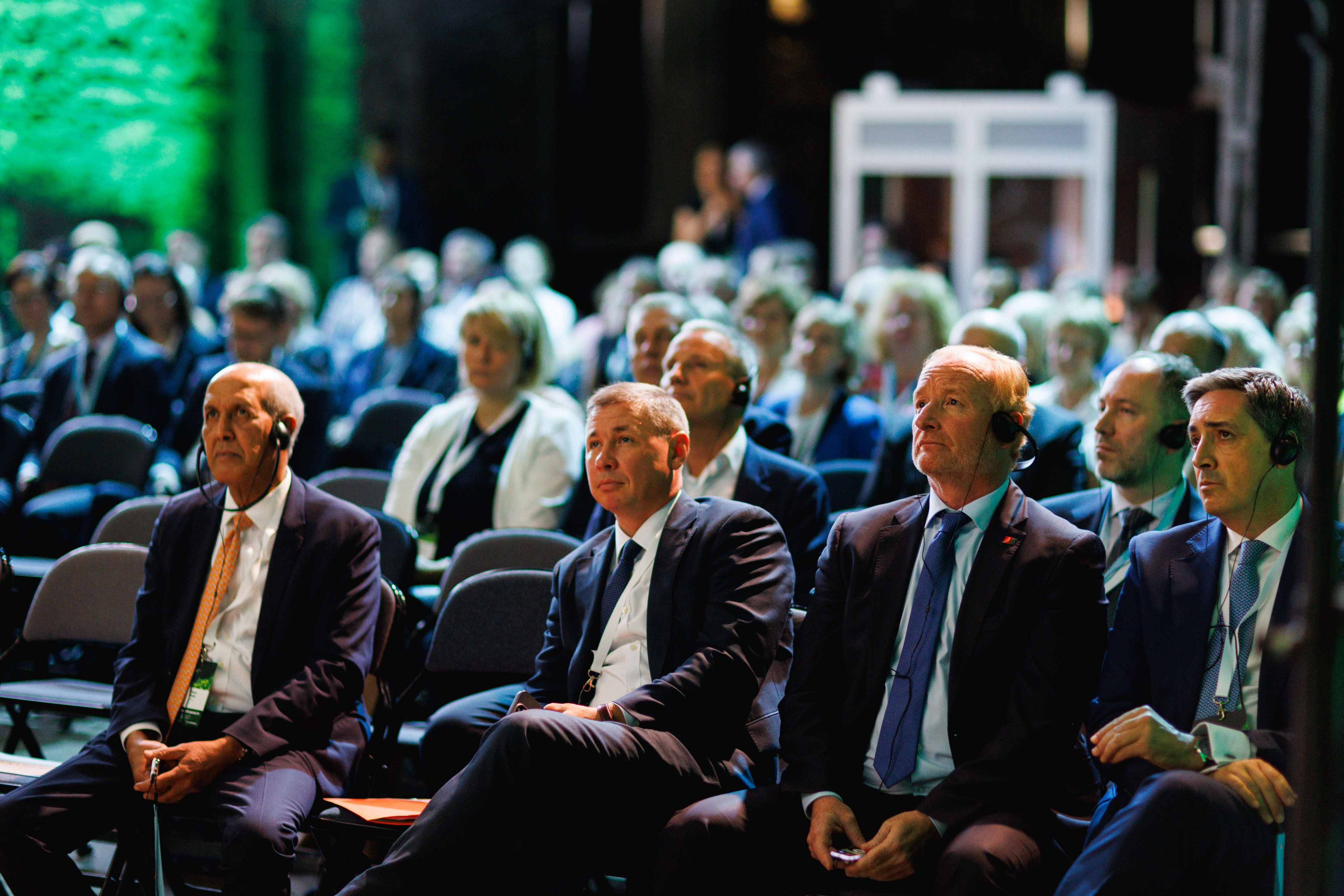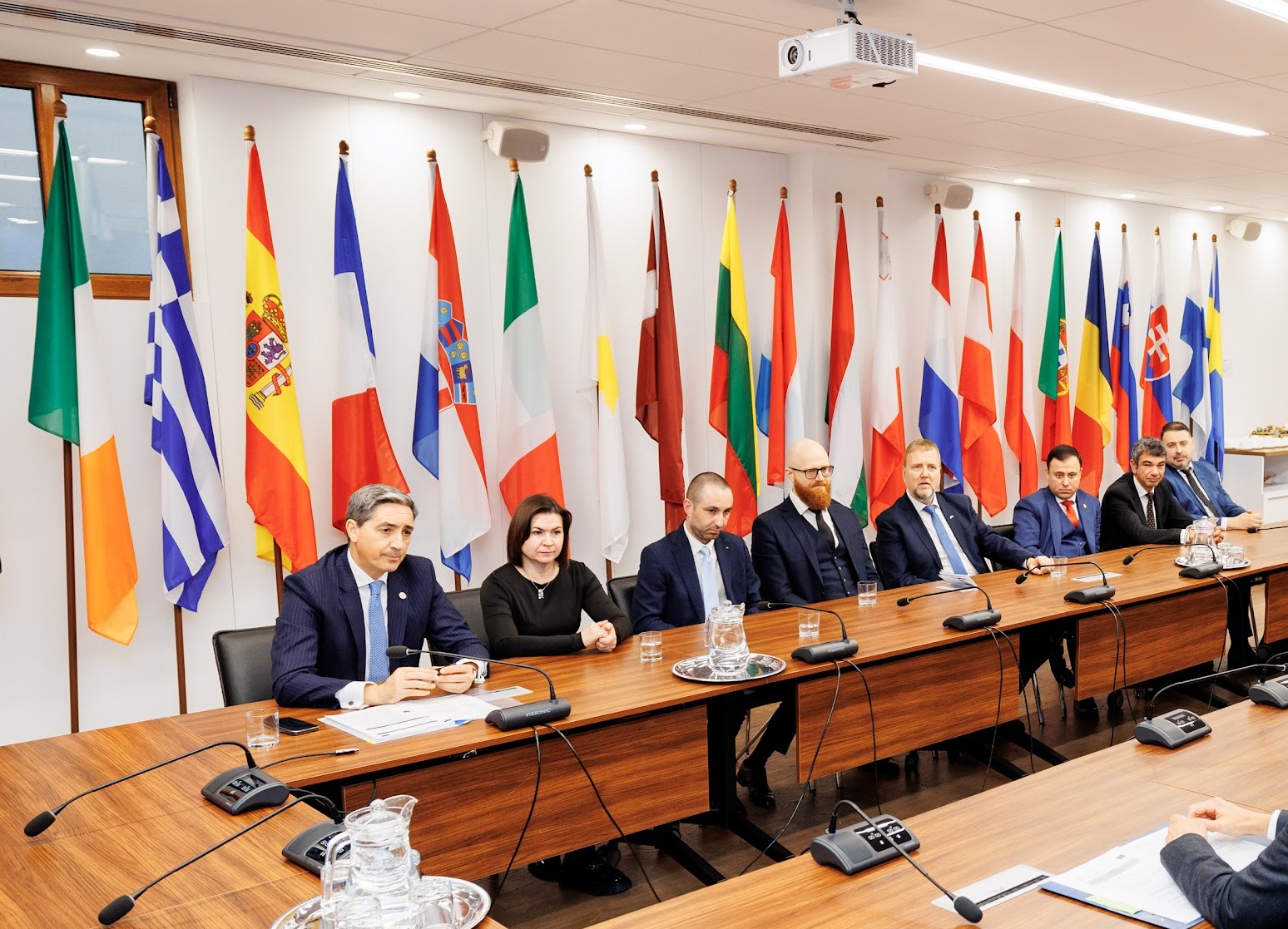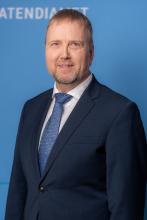World Intellectual Property Organization (WIPO)
The Republic of Estonia is a member of the World Intellectual Property Organization from 5 February 1994. The Republic of Estonia has acceded to all core level conventions and agreements administered by WIPO in the field of industrial property protection. From 1994 the Estonian delegation attends the annual meetings of the General Assembly of WIPO. Representatives of the Estonian Patent Office participate in the work of Group Central Europe and Baltic States, and the standing committees and working groups of WIPO. In 2024, Estonia made preparations for working as the coordinator of the Group Central Europe and Baltic States in 2025. This is the first time Estonia has undertaken this role.
The 65th WIPO Assembly took place in Geneva from 9 to 17 July 2024, with Estonia represented by Ambassador Riia Salsa-Audiffren, Permanent Representative of the Republic of Estonia in Geneva, Attaché Jaana Piilpärk, Margus Viher, Director General of the Patent Office and Cady Kaisa Rivera, Head of the Intellectual Property Right Department. In his opening remarks, Margus Viher, Director General of the Patent Office, expressed the strong support of Estonia for the work done by the WIPO to bring intellectual property closer to the people, despite the difficult times and drew special attention to the importance of supporting Ukraine. Continued support for rebuilding the intellectual property and innovation system of Ukraine, damaged by the ongoing war of aggression, is necessary and the role of the WIPO in providing this support is crucial. The horrific military strikes on Ukrainian cities and their civilian infrastructure – including the attack on a children’s hospital just before the Assembly – are a gross violation of the international humanitarian law. Estonia firmly condemns the unjustified and unprovoked war of the Russian Federation against Ukraine and will continue to support Ukraine for as long as required. Estonia expressed strong support for the activities of the WIPO that promote smart use of intellectual property rights from the grassroots level and help bring intellectual property closer to the people. It is crucial to focus these activities on SMEs and start-ups to ensure a strong, sustainable and balanced intellectual property ecosystem, where innovation can flourish.
Estonia also participates in the work of the WIPO Program and Budget Committee, which plays an important role in the preparation of the budget and action plans of the WIPO. Two long-prepared diplomatic conferences were held in 2024.
An official meeting with the Director General of the WIPO, Daren Tang, also took place within the framework of the WIPO Assemblies. The topics included the strong cooperation between the WIPO and the Patent Office, for example in the form of the Baltic knowledge transfer network, which is used as a model for creating similar networks in other countries, as well as in the fields of young people and intellectual property, the WIPO initiatives to support SMEs in the member states, normative work and the two diplomatic conferences held in 2024. The Director General of the WIPO was particularly pleased about the fact that intellectual property is part of a broader research and innovation strategy in Estonia. The Estonian public sector model in the field of intellectual property was also praised and it was found that it could serve as a good example for other WIPO member states – Estonia was invited to share its experiences. The digital initiatives and tools of the WIPO that support both SMEs and the start-up sector were also touched upon. We also extended an invitation to the Director General of the WIPO to visit Estonia.
Karoli Hindriks from the company Jobbatical carried on as a permanent member of the WIPO Global Awards Jury, representing the European continent. Together with five other top players in the international start-up and entrepreneurial scene from Peru, Saudi Arabia, France, South Korea, South Africa and Canada, she selected the nine winners of the year – SMEs from different corners of the world who have managed to build an innovative company with a strong social impact through skilful use of intellectual property. The jury members attended the Global Awards ceremony, shared their advice and experiences at a panel discussion and advised the winning companies.
Under the Patent Cooperation Treaty (PCT), the Protocol Relating to the Madrid Agreement Concerning the International Registration of Marks and the Geneva Act of the Hague Agreement, the Patent Office works in close daily examination-related cooperation with the International Bureau of the WIPO. Cooperation under the Protocol Relating to the Madrid Agreement Concerning the International Registration of Marks has been particularly extensive.
In 2024, the WIPO International Bureau sent 728 international trade mark applications for examination to the Patent Office and also 16 industrial design applications to the Patent Office for processing. One patent application was accepted for processing under the Patent Cooperation Treaty (PCT). The Patent Office is also involved in the implementation and public notification of amendments to WIPO guidelines and regulations, as well as new editions of international classifications and, where possible, translating them into Estonian.
The Estonian Patent Office mediates several e-services of WIPO to its customers and helps organise WIPO conferences and seminars in Estonia. Through the Patent Office, the WIPO presents the Young Inventor Award annually. The event took place for the eleventh time on 29 November at the PROTO Discovery Factory in Tallinn, where the best of the national student inventors’ competition were recognised and the recipient of WIPO and Patent Office award was announced. The winner was Johannes Amann, a first grade student at Saku Gymnasium, for his work ‘illuminated mechanic’s gloves’. The evaluation committee of the Patent Department found it a very practical invention that would be helpful anyone who has to work with both hands in the dark. The aspects deemed most important about an invention have been achieved – the invention is new, distinctive and solves an important technical problem.
The work of the network of specialists in IP commercialisation established as part of the WIPO Pilot Project continued in 2024.
On 26 September, WIPO released the seventeenth Global Innovation Index (GII) in Geneva, ranking countries on the basis of their innovation capabilities. This high-level event was attended by ministers, business leaders and innovation experts from several countries. Estonia ranked sixteenth out of 133 countries in the 2024 Innovation Index, which is the best result ever for our country. Innovation is assessed on the basis of nearly 80 indicators. Over the past decade, the GII has become a key source of reference when discussing innovation and a useful tool for the countries that have integrated it into their innovation policies. Estonia can undoubtedly be called an innovation leader – the top 25 countries in the ranking are considered as such. Although Estonia has been among the innovation leaders since 2015, we have risen by a record of 11 places compared to 2020.
The report highlights e-governance, imports of information and communication services, venture capital transactions and the value of unicorns in relation to the GDP as the strengths of Estonia. Estonia holds an absolute leading position in these areas, which means that it ranks first among all countries. The entrepreneurial culture and e-participation are also mentioned as the strengths of Estonia.
The University of Tartu, TalTech and Tallinn University have been identified as top innovators in Estonia. The most successful unicorns are Bolt, with a market value of 8 billion USD, and Veriff, with a market value of 2 billion USD. The report highlights, among other things, the income from the transactions involving intellectual property as a weakness in the case of Estonia. This clearly shows that the investments aimed at innovation could be significantly more efficient. The latter has created a somewhat paradoxical situation where Estonian entrepreneurs are at the forefront of innovation, while on the other hand, they tend to leave the results of their creative work without protection.
The gap indicated by the Innovation Index is also reflected in a study commissioned by the Patent Office. A Kantar Emor study showed that Estonian small and medium-sized enterprises are highly innovative. However, it was found that a large number of these companies fail to protect the intellectual property associated with the products and services created by them. Many entrepreneurs are not even aware that they have intellectual property in their company. Estonia still has a long way to go when it comes to the commercialisation of intellectual property. It is in the interests of the Estonian economy for all parties come together and support entrepreneurs in an even more meaningful and reason manner. Unprotected intellectual property undoubtedly poses a major risk to entrepreneurs, as well as to the economy and innovation of the country.
World Trade Organization (WTO)
Estonia has been a member of the World Trade Organization from 1999. The Estonian industrial property protection laws are in line with the Agreement on Trade Related Aspects of Intellectual Property (TRIPS) administered by the WTO.
European Union
The Republic of Estonia acceded to the European Union on 1 May 2004. Before this, the Estonian system for the legal protection of industrial property rights was aligned with the requirements of the European Union. As a result of the accession, about half a million European trade marks became valid in the territory of the Republic of Estonia. There are currently more than 1.6 million European trade mark registrations and nearly 977,000 industrial design registrations in force in Estonia. In the summer of 2023, the European Unitary Patent system came into effect, and the Unified Patent Court commenced its operations, with representatives of the Estonian Patent Office representing Estonia on its Administrative Council and Budget Committee.
European Patent Organisation (EPO)
On 1 July 2002, Estonia joined the European Patent Convention and became a full member of the European Patent Organisation (there were 39 full members on 31 December 2023). The European patent system is very flexible. The applicant has the choice to apply for protection in either all 39 member states or in particular states depending on their economic interests (but at the same time if the European patent becomes invalid in one state, it does not become automatically invalid in all 39 states). The system is also beneficial for the member state, as the state receives the validation and renewal fees of the European patents (differently from the European trade mark system).
The representatives of the Office participate in the work of the Administrative Council of the European Patent Organisation, the Budget and Finance Committee, the Committee on Patent Law, and several working groups. The office cooperates closely with Nordic and Baltic patent offices in the framework of the Administrative Council and the Committees.
The office works in close daily cooperation with the structural units of EPO within the framework of cooperation programs. Patent examination is carried out using EPO databases and EPO examination guidelines. EPO databases are constantly updated with the data concerning patents and utility models granted in Estonia. 1,031 European patents were enforced in Estonia in 2024. Altogether, there are 10,565 European patents valid in Estonia.
In the framework of a bilateral cooperation program the EPO assists the Estonian Patent Office with information technology and training, and finances the publication of industrial property related materials. In the framework of the European Patent Network, the Estonian Patent Office performs standard and special searches for the entrepreneurs of Estonia and other states.

On 1 June 2023, the European Union patent system with unitary effect entered into force. For applicants who wish to obtain patent protection for their invention in many member states, the new system provides many advantages compared to the classic European patent – obtaining a valid patent is easier, faster and cheaper. The opportunity to register a European patent with unitary effect at the European Patent Office has been available for a year and a half. This is a convenient opportunity for inventors to simultaneously obtain patent protection in all the member states of the European Patent Convention. Estonian applicants registered 10 patents with unitary effect last year. The unitary patent system does not replace the procedure established under the Convention on the Grant of European Patents, but offers the applicant an alternative for the protection of inventions in Europe. 18 Member States participate in the unitary patent system: Austria, Belgium, Bulgaria, Denmark, Estonia, Finland, France, Germany, Italy, Latvia, Lithuania, Luxembourg, Malta, Netherlands, Portugal, Slovenia, Sweden and Romania. More countries are expected to join in the future. Last year, 28,124 European patents with unitary effect were applied for and 48,771 were registered. It is important to note that the rights of all 48,771 patents with unitary effect also apply in Estonia.
European Union Intellectual Property Office (EUIPO)
On 1 May 2004, the Republic of Estonia joined the European Union system for the protection of trade marks and industrial designs. Due to this trade marks and designs automatically became effective in the territory of Estonia. As a result, the work volume of the Estonian Patent Office in the field of trade mark examination has significantly increased.
Representatives of the office take part in the work of the EUIPO Management Board, Budget Committee and expert working groups. The meetings of the EUIPO Management Board and the Budget Committee took place on the spot in Alicante. The Estonian Patent Office participates in several cooperation projects by EUIPO. The Office and EUIPO exchange data. In cooperation with EUIPO, the new software for examination of trade marks and industrial designs and e-services were updated. The Estonian Patent Office continues to introduce the European Union trade mark and community design protection systems to a broader public. Brochures on protection of industrial designs and trade marks have been published; relevant training and consultations have been provided. All that has taken place based on bilateral cooperation agreements with EUIPO.

In 2024, the DesignEuropa Awards organised by EUIPO took place in Riga. On this occasion, a representative of Estonia also reached the final round of the competition for the second time – in the category of small businesses, the Estonian company Arsenit made it to the top three with its prefabricated modular house Piil.
In January, the SME Fund, launched under the leadership of the EUIPO and the European Commission, was reopened, offering businesses financial support for the protection of intellectual property. Estonian companies are welcome to apply for support from the SME Fund.
Nordic and Baltic countries
The Estonian Patent Office participates in the cooperation of patent offices of the Nordic and Baltic countries. Directors-General of the patent offices hold regular meetings twice a year, where problematic industrial property issues in the whole world and Europe are discussed and joint statements are worked out. Examiners of the Estonian Patent Office participate in the trade mark, industrial design, patent and communication working groups between the Nordic and Baltic patent offices. On a day-to-day basis, there is also close communication and cooperation between the managements of the Nordic and Baltic offices. The meetings for Nordic and Baltic cooperation were organised by Norway in 2024. The cooperation meeting of the heads of patent offices took place in Oslo in June.
Cooperation with the Finnish Patent and Registration Office (PRH) continues under the cooperation protocol signed on 15 April 1992. Regular meetings with the managerial staff of the PRH are held. Reciprocal business trips of specialists are also organised, and the offices arrange joint trainings for their examiners and exchange their experience in the field of creation, adaption and application of information systems.
Cooperation between the Finnish, Lithuanian, Latvian and Estonian patent offices continues on the grounds of the Memorandum of Understanding, signed on 5 December 2006. The practical outcome of the cooperation is the working meetings between the intellectual property offices of the Baltic states. The tradition was given a new lease of life in Vilnius in February 2023 and the second meeting took place in Tallinn in December of the same year. The third annual meeting was held in Riga in 2024.
Ukraine
The cooperation between the Estonian and Ukrainian IP offices is based on the Memorandum of Cooperation signed in Geneva in 2018. After the war was started by Russia in Ukraine, on 1 March 2023, Estonia, Latvia, Lithuania, and Poland signed a joint cooperation agreement with the Ukrainian IP Office. The main objective of the agreement is to support Ukraine in rebuilding their intellectual property protection system after the end of the war. Estonia also supports Ukraine in the preparations to meet the requirements for accession to the European Union.
Upon invitation of the Patent Office, the Director of the Intellectual Property Office of Ukraine, Olena Orliuk, and the Deputy Director, Liubov Maidanyk, visited Estonia in June. This visit followed the visit of the Patent Office Director General, Margus Viher, to Kyiv in October 2024, where he familiarised himself with the work of the Ukrainian office and the legal protection of intellectual property under wartime conditions. Ukraine has been invited to join the European Union and several experience-sharing meetings have already taken place, so far in Poland, Ukraine and Moldova.
At the meeting held in Estonia, experiences were shared on the topic of the management of an intellectual property agency. Another important topic was accession to the European Union, integration into the EU legal area and the impact thereof on the agencies. The role of new technologies in the management of intellectual property rights (cloud technologies, blockchain, cybersecurity, etc) was discussed separately.

The guests were very interested in the digitisation of work processes, and archiving and preservation of digitised documents. We also presented the IT solutions, new information systems, and databases used at the Estonian Patent Office and discussed Ukraine’s prospects for joining the European Patent Convention. At a later meeting at the Ministry of Justice, the main topic was the harmonisation of copyright with the directives of the European Union. The harmonisation of the Ukrainian practices with those of the EU member states in the fields of patents, trade marks, industrial designs and geographical indications was also discussed. The guests introduced the practice of Ukraine regarding the EU regulation on geographical indications for handicraft and industrial products.
Estonia has been monitoring compliance with the sanctions imposed against Russia and Belarus since the outbreak of the war and the sanctions lists have been integrated with the information system of the industrial property register. We handle all requests from Ukrainian applicants and owners on a case-by-case basis and are prepared to extend the deadlines set by law to ensure legal protection of industrial property even in wartime.

